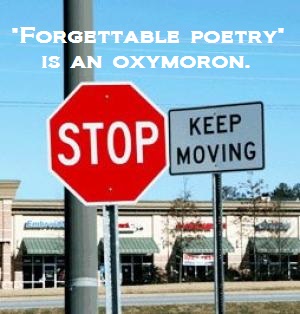"Never has it been so easy to earn a living as a poet."
Each "argument" for this conclusion is funnier than the last:
1. "There have never before been so many new books of poetry published..."
...none of which have sold.
2. "There are now several thousand college-level jobs in teaching..."
...but none in poetry, which involves writing and performing. Not teaching, per se.
3. "Congress has even instituted the position of poet laureate, as have twenty-five states..."
...not that any of these people "earn a living" for their efforts.
4. "There has also never before been so much published criticism about contemporary poetry..."
...almost none of which would be recognized as "criticism" when poetry was alive.
5. "...it fills dozens of literary newsletters and scholarly journals," having disappeared from more successful media.
6. "No one knows how many poetry readings take place each year" because no one attends them.
7. "With an average of ten poetry students in each graduate section, these programs alone will produce about 20,000 accredited professional poets over the next decade" whose failure proves that "professional poets" is an oxymoron.
8. "Not long ago, 'only poets read poetry' was meant as damning criticism. Now it is a proven marketing strategy." One assumes he means "proven failure as a marketing strategy." Were he serious, we wouldn't wonder why he is no longer working in the private sector.
 |
| Earl the Squirrel's Rule #123 |
10. "Usually the less a critic knows about verse the more readily he or she dismisses it..." or write endless blather about its content. Obviously, this article predated Facebook poetry groups.
When he speaks in earnest Gioia makes a number of points we echo here at Commercial Poetry. He writes this of the Watermelon Problem: "The heart sinks to see so many poems crammed so tightly together, like downcast immigrants in steerage. One can easily miss a radiant poem amid the many lackluster ones. It takes tremendous effort to read these small magazines with openness and attention. Few people bother, generally not even the magazines' contributors."
Of poetry's solipsism he comments: "Forty years ago, when Dylan Thomas read, he spent half the program reciting other poets' work. Hardly a self-effacing man, he was nevertheless humble before his art. Today most readings are celebrations less of poetry than of the author's ego. No wonder the audience for such events usually consists entirely of poets, would-be poets, and friends of the author."
While we may quibble, his "six modest proposals" held promise:
 |
| Earl the Squirrel's Rule #67 |
Agreed. We have reservations about the next three words: "Readings should be..." Perhaps they shouldn't exist. Perhaps they should be replaced by poetry performances. Why promote what even the author cannot remember?
2. When arts administrators plan public readings, they should avoid the standard subculture format of poetry only.
Ayup. As Shakespeare did. As bards and raconteurs did. As Leonard Cohen does.
3. Poets need to write prose about poetry more often, more candidly, and more effectively.
Heaven forfend!
Let audiences speak. Even their silence, owing to their non-existence, says infinitely more than the usual self-promoting spam from poets.
 |
| Earl the Squirrel's Rule #166 |
This is the problem, not the solution. Again, anthologists should present poems audiences¹ genuinely admire.
5. Poetry teachers especially at the high school and undergraduate levels, should spend less time on analysis and more on performance. Poetry needs to be liberated from literary criticism. Poems should be memorized, recited, and performed. The sheer joy of the art must be emphasized. The pleasure of performance is what first attracts children to poetry, the sensual excitement of speaking and hearing the words of the poem. Performance was also the teaching technique that kept poetry vital for centuries. Maybe it also holds the key to poetry's future.
We agree wholeheartedly on the value of performance, though obviously not on the definition and import of analysis.
6. Finally poets and arts administrators should use radio to expand the art's audience. Poetry is an aural medium, and thus ideally suited to radio.
 |
| Earl the Squirrel's Rule #175 |
Will Dana Gioia be a good poet laureate for California?
In his capacity as National Endowment for the Arts Chairman Dana Gioia brought "The Big Read" initiative to the U.S. from Britain in 2004. Two years later he instituted "Poetry Out Loud". Thus, Dana has already done more for poetry than all previous laureates--state or federal--combined.
We have observed an inverse relationship between one's value as a poet versus laureate. Even if this doesn't remain true, Dana Gioia rates to be the greatest poet laureate ever.
Watch this space.
Footnotes:
¹ - Or would admire, if such audiences existed.
Your feedback is appreciated!
Please take a moment to comment or ask questions below. Failing that, please mark the post as "funny", "interesting", "silly" or "dull". Also, feel free to expand this conversation by linking to it on Twitter or Facebook. Please let us know if you've included us on your blogroll so that we can reciprocate.
If you would like to follow us, contact us confidentially or blog here as "Gray for a Day" please befriend us, "Earl Gray", on Facebook.
We look forward to hearing from you.
Signed,
Earl Gray, Esquirrel






























